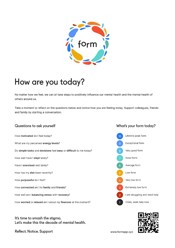
It’s the question we hear the most. And it is probably also the question we ask the most. Yet according to Rob, most of us rarely answer it honestly.
The question, of course, is “how are you?”
“We hear it countless times a day’” says Rob. “Normally, we answer it with ‘I’m good’ or ‘I’m fine’ or ‘I’m alright’ or ‘I’m OK’. We shut it down and push it away.”
Rob says that we might give an honest answer if we are feeling under the weather physically. But when it comes to our mental health, it’s different. For example, it is very rare for us to say “I am feeling pretty anxious today and hope that I don’t experience a panic attack.”
Has this question become void of meaning?
How often have you asked the question ‘how are you’ and then carried on walking? What if, when you ask that question, it was the one time that person has during the day to say ‘I’m not doing that well, actually’.
According to Rob, adding just one word to that question could make a significant difference.
The one word that could change your life
The word is “today”.
Rob believes that when we ask “how are you today?” instead of just “how are you?”, it transforms the question to focus on a specific point in time.
“Adding the word ‘today’ helps people stop, pause, reflect and notice their form in that moment” says Rob. “It also reflects how our form, or mental health, fluctuates daily. So it is a fresh question each day.”
The goal, of course, is to encourage more open and honest responses. Because once we are openly talking about the status of our mental health, we can do more to improve it. And that’s where Rob’s next technique comes in handy.
Scoring your mental form
“When I answer this question and share how I am, I share my Mental Form Score, which is a number out of 10” explains Rob. “At the time of doing this interview, I am a 5/10, which means poor form for me. This is to be expected, as my dad passed away a few days ago.”
Rob says that there is something powerful about using a number to answer the question of “how are you today?”
“We are more comfortable describing our mental health with a number than we are saying that we have anxiety, or body image concerns” he says, “and there is an easy and objective way to calculate your score.”
10 simple questions to calculate your form
Rob’s latest venture, Form, outlines a quick way to calculate your form each day. You simply ask yourself 10 questions, giving each a score out of 10:
1. How motivated do I feel today?
2. What are my perceived energy levels?
3. Do simple tasks and decisions feel easy or difficult?
4. How well have I slept lately?
5. Have I exercised well lately?
6. How has my diet been recently?
7. How purposeful do I feel?
8. How connected am I to family and friends?
9. How well am I balancing stress with recovery?
10.How worried or relaxed am I about my finances?

“Your Mental Form Score is an average out of 10” says Rob. “Whenever I ask people to discuss their Form with the person next to them during keynotes, the reaction is always electric. High levels of engagement, eye contact, and a lot of smiles. When you put a number on how you’re feeling, people experience a more meaningful human connection.”
The biggest business cost is presenteeism
By discovering how your colleagues are feeling, Rob says you can begin to support them in ways such as encouraging them to take time off when they need to. After all, presenteeism – people turning up to work who are not fit to do so – is one of the biggest costs for Australian employers.
The recent report from BeyondBlue updating the case for investment in employee mental health suggests that of the $10.9bn that mental ill-health costs Australian employers, the largest element of this is due to presenteeism – up to $6.1bn. This number has grown significantly in the last few years and far exceeds both the costs of people absent from the workplace, and those of staff turnover.
The decade of mental health
As we move into 2020, Rob believes we are entering “the decade of mental health”.
“I think that by the time 2030 rolls around, we will have smashed the stigma of mental ill-health” he says. “There will be no need to publish the InsideOut Leaderboard, because the health and wellbeing of employees will be just as important as the creation of shareholder value.”
To support Rob in his work to encourage more people to discuss their mental form, you can download the “How are you today?” poster here.

 UK
UK
 SG
SG
 MY
MY
 US
US
 IE
IE